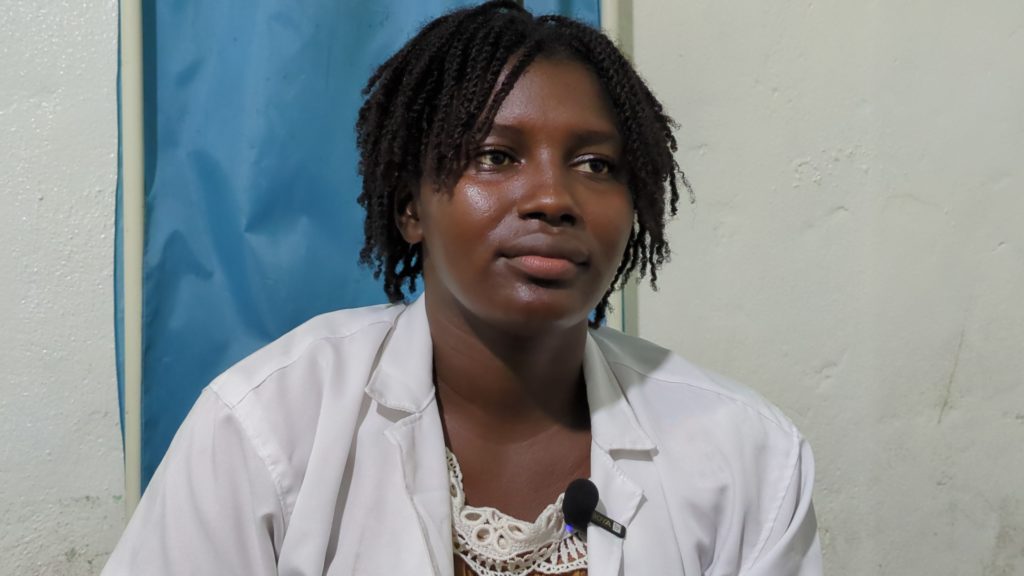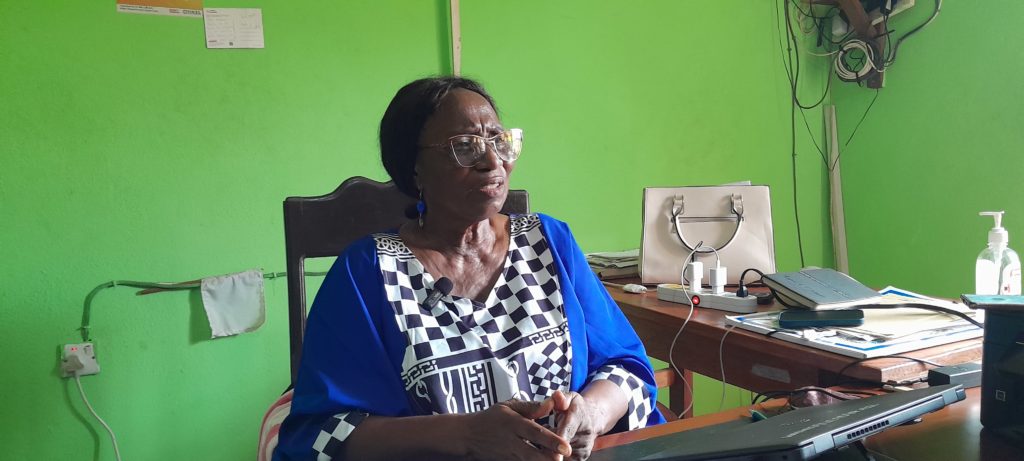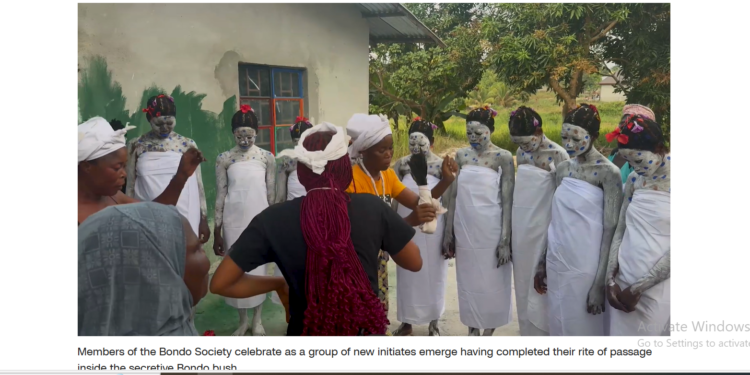By Kemo Cham

Mamie Kailondo is an intern at the AMT Hospital in Bo, southern Sierra Leone. Her daily work routing is conducting health talks, advising patients on recommended health seeking behaviors, like Infection Prevention Control measures.
Mamie is a second year student at Njala University Bo campus, where she is pursuing a four-year degree programme in health education. She also shares her time volunteering in campaign against Female Genital Mutilation (FGM).
Like many anti-FGM campaigners in Sierra Leone, Mamie’s involvement in this advocacy was stimulated by her experience as a survivor of the highly controversial cultural practice that has divided the country due to the harm associated with it.
“The experience of FGM is not easy. I still go through the pain,” she laments.
And like many other activist-survivors, her traumatic experience in the hands of Sowies – the leaders of the female secrete society who conduct the cutting – fuels Mamie’s passion in her mission. She was seven years old when she was initiated in 2010. Now 21, she recalls been blindfolded, someone sitting on her stomach and another person holding her legs, while they tried to restrain her to remove her clitoris.
FGM, also called Female Genital Cutting (FGC), is defined as all procedures involving partial or total removal of the female external genitalia or other injury to the female genital organs for non-medical reasons. The United Nations considers it as a violation of girls’ and women’s human rights.
Health experts say when girls are cut they face the immediate risk of haemorrhage, shock, serious injury, and a range of infections, and even death, when haemorrhage or infections are especially severe. Victims also face threat from infection and tetanus when unsterilized or rusty tools are used to cut their flesh, and this risk heightens when the same tool is used to cut multiple girls.
Many FGM survivors go through a life time of painful experience as a result of this, including scarring, cysts, abcesses and other tissue damage, infertility, and increased susceptibility to infections, according to a Unicef report. Many also complain experiencing difficulty and pain when they menstruate, urinate or have sexual intercourse.
Complications during childbirth is also a common experience among victims of FGM, including obstetric fistula, in a country still battling high maternal mortality rate, despite recent gains.
On top of all these, there is the psychological impact on the survivors.
“Up to this day, sometimes when I go through my menstrual period, I feel pain in my lower abdomen. I have to rest in bed for days for the pain to subside. Even though I survived, that is a pain I still go through,” says Mamie.
The UN has adopted a series of resolutions urging intensification of global efforts to eliminate FGM, with a key one being General Assembly Resolution 77/195 in 2022. It has also called on states to take measures to protect girls from the practice and to raise awareness about it. UN data indicate that over 230 million girls and women have been cut globally, and Africa is said to account for the largest share of this total, with over 144 million.
Sierra Leone is ranked among countries on the continent with the highest prevalence of FGM. In 2024, the country recorded three deaths as a result of the practice. All of the victims were underage. But some campaigners believe the number of FGM related fatalities could be higher, if not for the high secrecy surrounding the practice.
FGM’s association with a deep-seated tradition – the Bondo – makes it difficult to deal with, notes Hanna Yambasu. An FGM survivor herself, Hannah has been in this campaign for the last two decades, having founded the Women Against Violence and Exploitation in Society Sierra Leone (WAVES-SL) in 2005 to advocate for issues affecting women and girls.
“My experience of it was horrible, so I grew up hating it. That is why I do what I do,” she says.
Efforts to end FGM in the country has also been made difficult largely due to the support it gets from the political class. While proponents of the practice argue in favour of protecting cultural heritage, there is a lot of evidence pointing to other drivers, like individual monetary gains. For politicians, it’s always about not upsetting voters.
As the case of Lucy Kamara shows, some people also use FGM as a weapon for punishment. The mother of two was forcefully reinitiated recently, years after she was first cut. Her crime was quarrelling with an elderly neighbor. Her case was taken up by WAVES-SL which laid a complaint with the Sierra Leone Police. But the organization is unhappy about the pace of the investigation.
“All I want is justice,” says Lucy, who breaks down while narrating how she fought against seven women in the Bondo Bush as they tried to cut her as punishment for insulting her elder. “I go through a lot of pain, especially when I engage in sexual intercourse.”
With the election of President Julius Maada Bio in 2018, hopes were raised among rights campaigners, thanks to his expressed policies promising to protect women and girls. The First Lady Fatima Bio’s Hands Off Our Girls initiative, also upped the level of optimism among campaigners. This hope climaxed a few months ago with news of the impending enactment of an amended version of the Child Rights Act 2022. According to activists, the draft Bill contained a clause banning FGM. But when it was eventually passed, the clause was nowhere to be seen, prompting questions about what exactly happened and where.

Despite appeals for President Bio not to sign it into law, he did, rather discretely. The news was only made public on October 14th, during a government town hall meeting. The country’s Solicitor-General, Robert Kowa, who broke the news, didn’t give any indication as to when the President signed the piece of legislation. The news came both as surprise and shock to rights campaigners.
“It’s a huge disappointment for girls of this country,” says Hannah. “The President said he had interest in protecting women and girls, but apparently he isn’t serious about that. If he was serious about the lives of people, he wouldn’t have put his signature on that document, considering the number of lives we have already lost to this practice.”
For Regina Kombe Kajue, Director of the Voice for the Voiceless Woman, another anti-FGM campaign group based in Bo, the president’s signing of the Child Rights Act with the clause banning FGM renders his previous gains in women’s empowerment null and void. According to her, child marriage is closely tied to FGM, noting that it makes no sense banning child marriage while allowing FGM to continue.
“FGM is a contributing factor to early marriage, because when girls are initiated, the next thing for them is to get married,” she explains.
Critics also point to the irony of President Bio’s action as the current chairman of the sub-regional bloc – the Economic Committee of West African States (ECOWAS) – whose highest court recently declared FGM as torture. The ECOWAS Community Court of Justice, in a ruling on a case filed by the Forum Against Harmful Practices (FAHP), a coalition of civil society organizations campaigning against FGM, ordered the state to legislate against the practice. Observers say that ruling in July this year set a regional precedent for women’s rights protection in Africa. But the government has been tightlipped since the ruling.
FAHP, to which WAVES – SL belongs, is supported by the global non-profit Equality Now, which seeks to attain gender equality through legal and systemic change. Caroline Lagat, Programme Officer for Ending Harmful Practices at the Nairobi based Africa office of Equality Now, shares the same sentiment widespread among local campaigners. She recalls during a 2022 visit by a team from Equality Now, when they met with various government officials who assured them that placing a ban on underage initiation was one of the top priorities of the government.
“We had fate that that is what would have happened. And of course the first draft of the bill had that. It’s unfortunate that after the debate in parliament it was removed. So that basically means that there is no protection mechanism for girls in the country,” she says.
But for these campaigners, despite the disappointment, there is no letting up.
Lagat says ECOWAS remains an important platform to reach their goal. She says as chairman of the regional bloc, Bio has to be a “role model” for fellow presidents.
Also, “in terms of strategy globally, Sierra Leone as a member of the UN and also AU, has signed a number of human rights treaties, and we will continue to do advocacy there as we collaborate with our partners here in Sierra Leone,” she says.






















